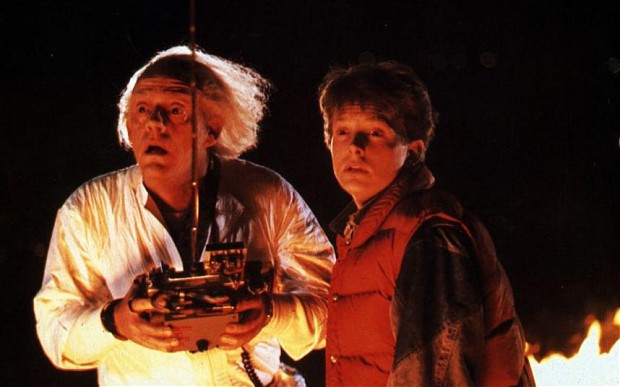|
Move over Marty McFly - time travel, invisibility cloaks and teleporting could all happen within today's schoolchildren's lifetimes, experts agree.
Children could be travelling between centuries as soon as the year 2100, while teleportation could become a regular occurence by around 2080, professors from Imperial College London and the University of Glasgow have said.
“The good thing about teleportation is that there is no fundamental law telling us that it cannot be done and with technical advances I would estimate teleportation that we see in the films will be with us by 2080,” said Dr. Mary Jacquiline Romero from the School of Physics and Astronomy, University of Glasgow.
“Teleporting a person, atom by atom, will be very difficult and is of course a physicist's way, but perhaps developments in chemistry or molecular biology will allow us to do it more quickly.,” she said.
Time travel into the future has already been achieved, but only in miniscule amounts, Colin Stuart, science communicator and author of The Big Questions in Sciencesaid. Related Articles.
“Time travel to the future has already been achieved, but only in tiny amounts. The record is 0.02 seconds set by cosmonaut Sergei Krikalev. Whilst that doesn't sound too impressive, it does show that time travel to the future is possible and that the amount of time travel couldn't be far greater," he argued.
“If you travelled through space on a big loop at 10 per cent the speed of light for what seemed to you like six months, approximately six months and one day would have passed on Earth. You'd have time travelled a day into the future. Travel at the same speed for 10 years and you'll time travel nearly three weeks into the future. I would say we are looking at 2100 as a very optimistic timescale for travelling weeks into the future.”
Invisibility cloaks, as featured in Harry Potter, could be "entirely feasible" within the next 10 to 20 years, Professor Chris Phillips, Professor of Experimental Solid State Physics at Imperial College London said.
Harry tests his invisibility cloack for the first time.
“One way to create an ‘invisibility cloak’ is to use adaptive camouflage, which involves taking a film of the background of an object or person and projecting it onto the front to give the illusion of vanishing,” he added.
“We’re actually not that far away from this becoming a reality – rudimentary technology versions of this have already been created – but the main problem is that the fibre-like structures in the adaptive camouflage need to be so tightly woven that it’s incredibly labour intensive. With developments such as 3D printing allowing us to create previously impossible materials, it’s entirely feasible that we could see a ‘Harry Potter’-like invisibility cloak within the next 10 to 20 years.”
The research was conducted by the Big Bang UK Young Scientists and Engineers Fair, which compared the predictions of scientists to that of a panel of 11-16 year-olds.
While their speculation was largely in line with the experts' expectations, the children thought time travel could be feasible by 2078. They also dramatically overestimated when they might be able to become space tourists - anticipating it might take another 30 years, when commercial space flights are due to launch in 2015.
In 2011 Nike created Marty McFly's famous self-tying trainers as featured in the second instalment of the Back to the Future franchise, to the delight of fans worldwide. Scientists and engineers also teamed up earlier this month to create a real hoverboard, as funded by Kickstarter.
Paul Jackson, of EngineeringUK, said the research demonstrated how although adults may be constrained by what we believe to be possible, the imagination and creativity of schoolchildren knows no bounds.
“This is so encouraging to hear, because ultimately it will be the younger generation who make these sci-fi dreams a reality – and it’s crucially important to spark their interest now to supply the next cohort of scientists and engineers that Britain desperately needs to continue this research,” he said. |
有人認為,馬蒂·麥克弗萊(Marty McFly�,電影《回到未來》中人物 )的動作——穿越,隱身斗篷和瞬移都是有可能在目前還是學齡兒童的有生之年實現(xiàn)的�。專家們對這一觀點表示認同。
帝國理工學院(Imperial College London)和格拉斯哥大學(the University of Glasgow)的教授們稱��,到2080年左右�����,瞬移就可能成為司空見慣的現(xiàn)實�,但孩子們穿越世紀的夢最早得到2100年得以實現(xiàn)。格拉斯哥大學物理與天文學院的瑪麗·杰奎琳·羅密歐(Mary Jacquiline Romero)博士表示:“瞬移的優(yōu)勢在于并沒有基本法明文禁止這一行為���,隨著科技的進步,我預計這種之前只有在電影熒幕上才得以見到的技藝在2080年之前就可以成為現(xiàn)實��?�!?/p>
她說道��,“要以原子為單位實現(xiàn)人的瞬移將是一件非常困難的事��,而且要通過物理方法才能得以實現(xiàn)�,但化學和分子生物科技的發(fā)展可能會加快這一進程�����?���!?/p>
科學傳播者��,《科學大問題》(The Big Questions in Science)的作者科林·斯圖亞特(Colin Stuart)表示��,穿越到未來的愿景已經實現(xiàn),只是覆蓋范圍還不夠廣���。他說,“穿越到未來不再是一個夢���,但其覆蓋面不夠廣泛�。這一記錄的保持者是俄羅斯宇航員克利卡列夫(Sergei Krikalev)���,穿越時間為0.02秒��。盡管這一數(shù)字聽上去并不是那么驚艷��,但它表明了穿越到未來是可能實現(xiàn)的�,穿越時間也會不止0.02秒?��!?/p>
“如果以光速的10%的速度呈大環(huán)狀在空間穿梭六個月����,地球上則已經過了六個月零一天���。那么你就穿梭了一天的時空�。相同速度下��,十年累計下來你就向未來穿梭了將近兩周的時間�。因此我認為要在2100年實現(xiàn)穿越到幾周后的未來是完全有可能實現(xiàn)的���,我們對這個時標抱以非常樂觀的態(tài)度���。”
帝國理工大學實驗和固態(tài)物理學教授克里斯·菲利普(Chris Phillips)稱��,哈里·波特系列電影中出現(xiàn)的隱形斗篷在未來的十到二十年時間里完全具有可行性。
哈里第一次測試了他的隱形衣�����。
他補充道��,“發(fā)明隱形衣的一種方式就是使用具有自適應功能的偽裝裝置����。這包括將人或物的背景投射到前方,造成一種消失的視覺假象�����?��!?/p>
“事實上�,我們很快就可以將這一愿景變成現(xiàn)實了——基本技術雛形已經完成----但是主要問題在于偽裝裝置中類似纖維的結構需要編織得緊密一點����。隨著3D打印等技術的發(fā)展,我們得以發(fā)明一些此前根本不可能存在的材料�。因此在未來的10年到20年內我們完全有可能看到哈里·波特同款的隱形衣面世。”
該研究由大爆炸英國青年科學家與工程師集會(Big Bang UK Young Scientists and Engineers Fair)開展����,他們將科學家的預測與一群11-16歲孩子的預測作了一個比較。
盡管孩子們的推測與專家們的預期在很大程度上相符��,但孩子們認為穿越要到2078年實現(xiàn)�����。他們還大膽預測了有能力進行太空之旅的時間——他們的預計是鑒于商用太空船將于2015年發(fā)射����,太空旅行應該再過三十年也可以實現(xiàn)��。
2011年����,耐克推出了馬蒂·麥克弗雷在電影《回到未來2》(Back to the Future)中亮相的運動鞋款���,令全世界的粉絲大為驚喜�?�?茖W家和工程師們本月早些時候也在Kickstarter上籌資���,計劃發(fā)明一種真正的時光滑板����。
英國工業(yè)協(xié)會(EngineeringUK)的保羅·杰克遜(Paul Jackson)稱��,該研究表明盡管成人會受到可能性的制約���,學齡兒童的想象力和創(chuàng)造力確實無邊無際的。
他說:“這是一個振奮人心的消息����,因為最終將科幻小說里的情節(jié)轉變成現(xiàn)實的就是年輕一代——目前致關重要的就是激發(fā)他們的興趣��,英國要繼續(xù)發(fā)展這一研究所急需的就是新一代的科學家和工程師的補給?�!?/p>
(譯者 Jessielanting 編輯 祝興媛)
掃一掃����,關注微博微信
 
|


